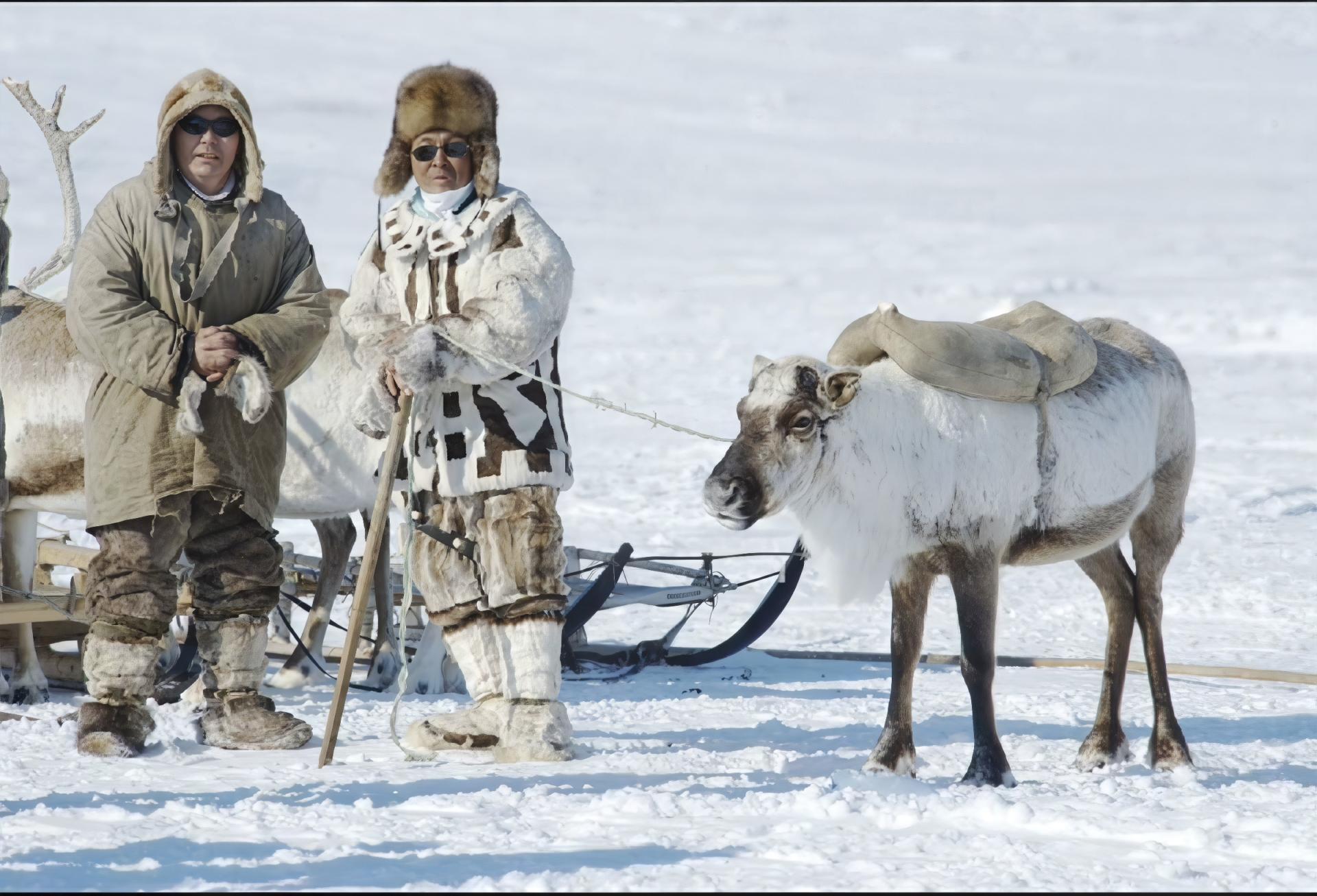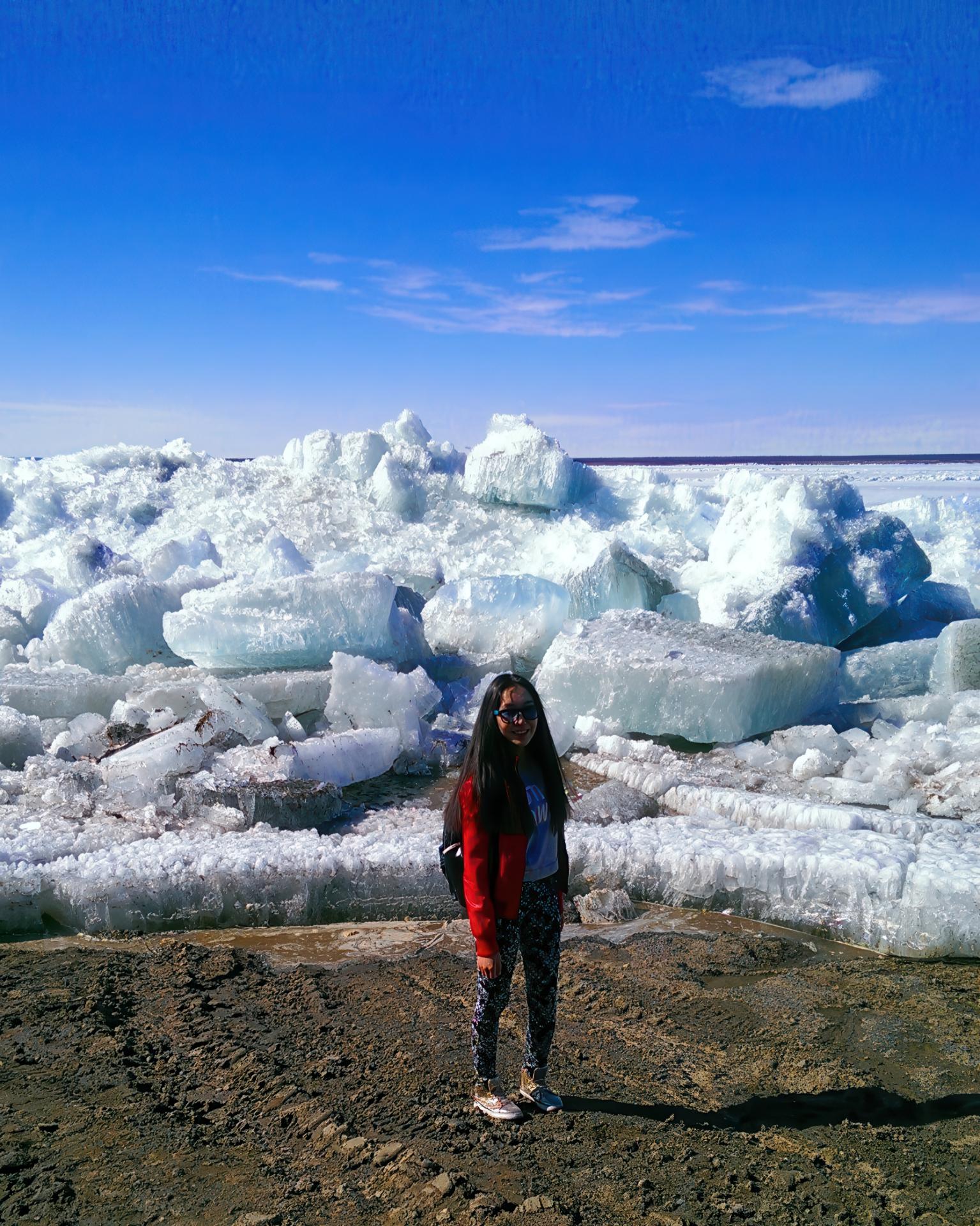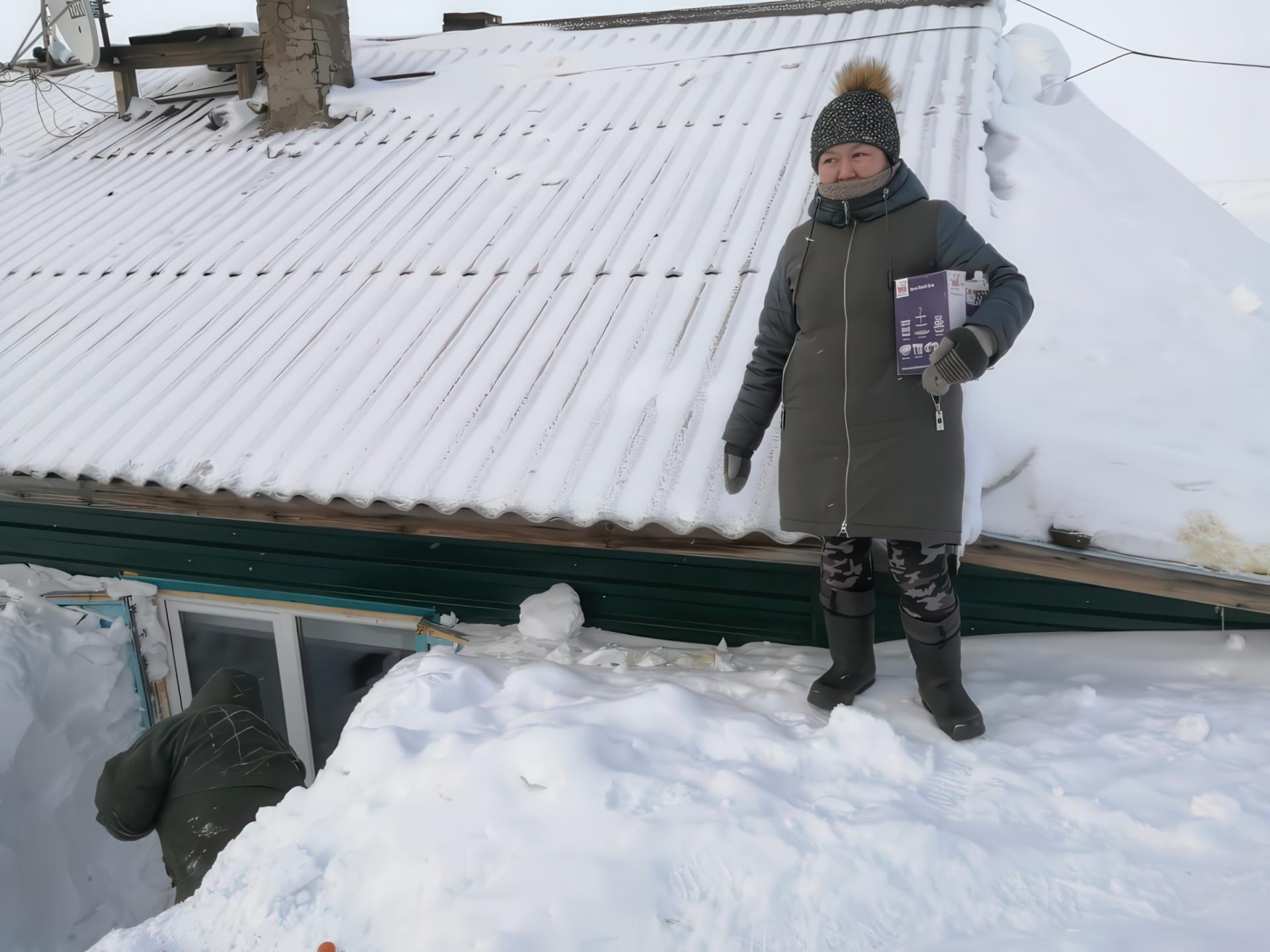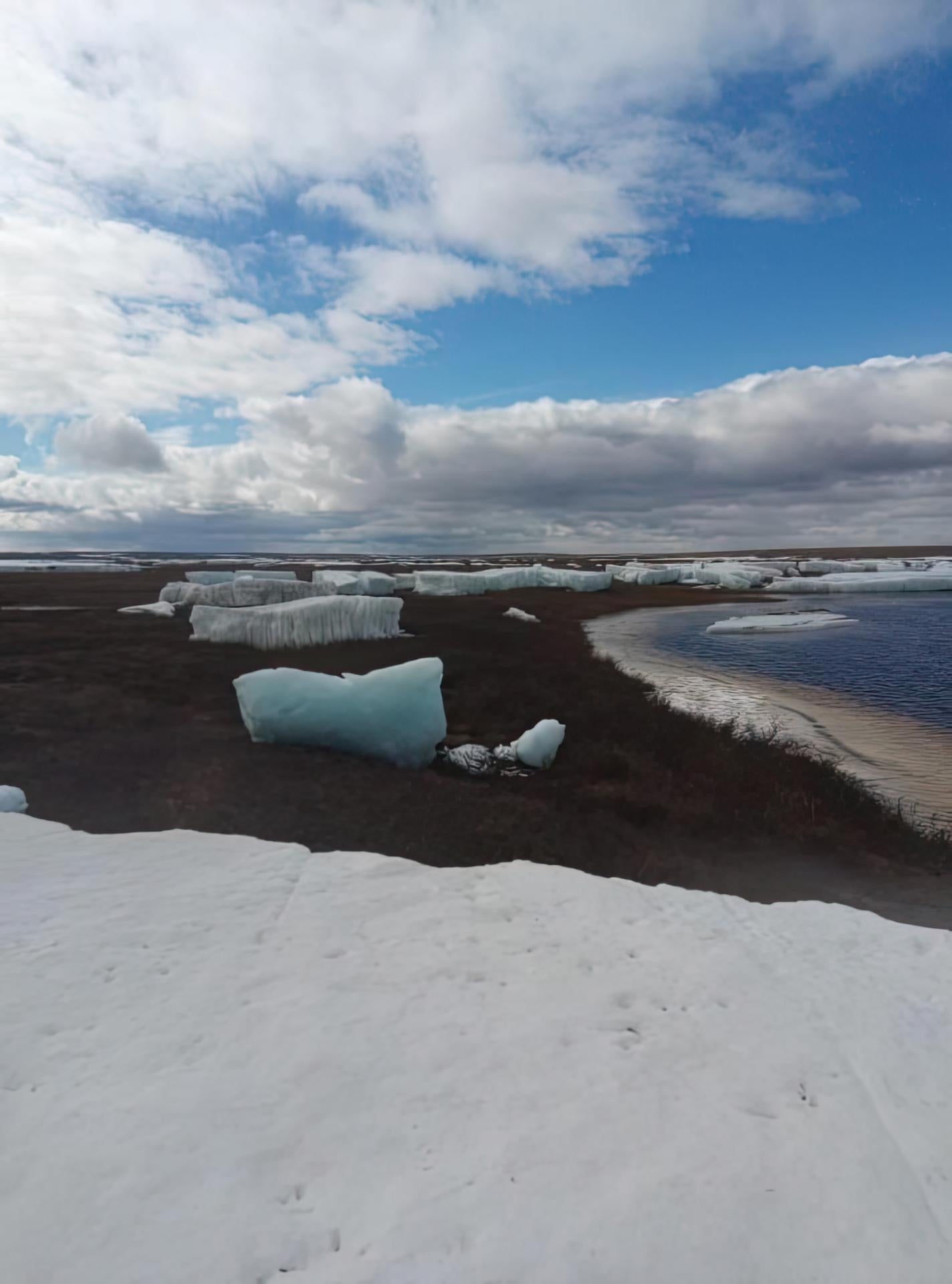
Kseniia Bolshakova (Dolgan) es una activista del Ártico ruso que trabaja para revitalizar su lengua dolgan y defender sus tierras ancestrales. Su novela, «La escarcha también se derrite», aborda los problemas del cambio climático, la pérdida del pastoreo de renos y la actual extinción de las lenguas Indígenas. Bolshakova vincula el deshielo del suelo congelado, las prácticas interrumpidas de un modo de vida nómada y la migración sin precedentes hacia el sur de los renos salvajes con la línea rota de transmisión de las lenguas nativas en la comunidad.
Crecí en una familia de pastores de renos en la tundra de la península de Taimyr. Soy una de las guardianes más jóvenes de la lengua nativa en nuestra nación. Hoy en día, menos del 10% de los dolganos hablan la lengua nativa. Menos de 10 familias dolganas en toda la nación continúan con el modo de vida nómada y crían renos. Hace tan solo 10 años, había docenas de familias dedicadas a la cría de renos. Y hace cien años, todas las familias tenían renos. En la década de 1920, había 500.000 renos domésticos en toda la península de Taimyr. Ahora, los pastores de renos de Dolgan que quedan no tienen más de 2.000 renos.
Las personas que están abandonando la vida nómada no lo hacen por elección propia. El calentamiento global ha traído lluvias invernales que nunca se habían producido más allá del Círculo Polar Ártico. El musgo blanco encerrado en el hielo condena a los renos a morir de hambre. Esta tragedia ecológica afecta a las manadas de renos de las penínsulas de Yamal y Taimyr. Es extremadamente difícil restablecer una población disminuida de renos domésticos, ya que hay muchas otras formas naturales de pérdida de renos. El rebaño puede ser atraído por renos salvajes, devorado por lobos y osos, o muerto por la enfermedad de las pezuñas y la brucelosis.

Ancianos dolgan pastoreando renos.
Sin embargo, creo que esto es simplificar demasiado. El modo de vida tradicional es garantía de la conservación de la lengua ancestral. Pero, ¿Puedo yo, como Dolgan, hablar realmente mi lengua ancestral sólo en un campamento de pastores de renos en la tundra? Mi lengua es vibrante y tiene un potencial de desarrollo muy alto; en manos de un hablante nativo experto, se aplica a todos los ámbitos de la vida. Entonces, ¿Qué está pasando realmente? ¿Por qué la lengua persigue a los renos?
El pastoreo de renos es nuestro propio medio de vida y nuestra propia producción. Al perderla, nos vemos inmersos en un mundo construido y hecho por los rusos, incluso en un asentamiento donde el 99% de la población es dolgana. Ésta es la raíz de nuestro problema y la gran incógnita de nuestra continuidad como nación Indígena. Hasta hace poco, los Dolganes intentaban cambiar la sostenibilidad del pastoreo de renos a la caza de renos salvajes.
Según los servicios regionales de medio ambiente, la población de renos salvajes de nuestra península de Taimyr ascendía a 485.000 en 2009. Para el año que viene se esperan sólo 70.110 renos. A este ritmo, la población de renos salvajes de Taimyr podría desaparecer por completo en 2030. Debido al cambio climático, nuestros renos salvajes se dirigen al sur, a la República de Saja. Allí atraen a los renos domésticos de los pastores Evenki y Sakha a una escala sin precedentes. Esto supone una grave amenaza para la supervivencia de la cría de renos en la región.
El cambio climático no sólo está transformando nuestro modo de vida tradicional, sino que también supone una amenaza inminente para nuestra existencia como Pueblo Indígena, tanto en términos físicos como étnicos. Los Dolgan viven en la zona de permafrost. Para entender qué es el permafrost, qué significa para los dolganos y qué le está haciendo el calentamiento global, sugiero que descendamos al vientre de la escarcha.

Kseniia Bolshakova delante de un banco de hielo.
EN EL VIENTRE DE LA ESCARCHA ("Capítulo de la novela «La escarcha también se derrite", de Kseniia Bolshakova)
Abierta de golpe, la trampilla de madera tapizada con piel de reno cae pesadamente al suelo. Los perros que yacen cerca saltan, asustados, y salen corriendo al porche. Miro hacia el pasadizo y el olor a metal viejo y escarcha me llega a la nariz. Al chocar con el frío permanente, los grumos blancos de mi aliento se dispersan al instante. La tenue luz de una bombilla ilumina el fondo del pozo de hierro.
Me agarro a la escalera soldada y doy un paso decisivo hacia abajo. El túnel, hecho de barriles de petróleo soldados entre sí, se adentra en el permafrost. A cada paso, el aire se vuelve más pesado y helado. Lo más importante es no resbalar. El tubo oxidado de tres metros de largo desemboca en un pequeño balok subterráneo.
El techo bajo y arqueado, las paredes, el suelo... todo en la cámara helada está hecho de cristales mates. Mis manos tocan por sí solas los diminutos trozos de cristal. Protegiéndose del calor de las manos, las agujas heladas me arañan las yemas de los dedos. Si fuera tan alto como Hubruu Basi (Gangly Vasya) también podría tocar el techo.
Tres niveles de estanterías se extienden a lo largo del perímetro. Los cadáveres de ciervos salvajes yacen inmóviles en sus pieles, una especie de envoltorio natural. El pescado está escondido en sacos. Encuentro nuestro saco por el lazo. Saco un gran pescado blanco.
Mamá me envió por pescado al túnel de escarcha de los Opanasiuks para hacer stroganina, pescado congelado en lonchas finas. Unos vecinos amables, nos asignaron un lugar en su nevera provista de naturaleza. Los habitantes de Popigai son casi todos pescadores y cazadores, pero no todos tienen su propio túnel de hielo. Sólo hay siete para las varias decenas de familias del pueblo. No basta con excavar un túnel de hielo, hay que cuidarlo. Todos los años se frotan las grietas de las paredes del frigorífico con una mezcla de nieve y agua.
Los habitantes de Popigai llevan mucho tiempo haciendo campaña para que se construya un túnel de congelación común para todo el pueblo. Una obra así es complicada, larga y costosa. Sin embargo, por fin consiguieron la financiación. Llegó un equipo para comprobar el suelo y, como si nada, la tierra ya no es lo que era. La escarcha se está derritiendo.
En los últimos años, la presión del calor está haciendo retroceder tanto la noche polar como el largo invierno ártico. Antes, a principios de junio, la gente todavía andaba en motonieve y el hielo de los ríos apenas empezaba a deshacerse. Ahora, a finales de mayo, la corriente de hielo ya está en marcha. El otoño también tarda más en llegar. Antes, el río dejaba de fluir en septiembre, pero ahora no empieza a helarse hasta principios de octubre.

Grandes cantidades de nieve en el pueblo de Bolshakova, Popigay.
Esta conmoción de la naturaleza es tan poderosa que pronto los pastores de renos se verán como jardineros. Alrededor de las casas de nuestros pueblos no hay parcelas de tierra que labrar. La gente planta patatas en la tundra abierta. Si esto sigue así, pronto no sólo crecerán patatas en Taimyr. Aparecerán animales e insectos del sur, escarabajos picadores de cuernos largos inauditos. Los incendios forestales en las tierras de Evenki y Sakha empujan a los corzos hacia el norte.
El bosque siempre ha ardido, pero el calentamiento hace que los incendios crezcan de forma aterradora, amenazando a animales y humanos por igual. ¿Y qué hacen las autoridades? Simplemente reducen su flota de helicópteros de bomberos. Al parecer, enviar helicópteros para apagar los incendios del bosque es más caro que la madera. Se podría decir que no todo se puede medir en beneficios y pérdidas. No todo. Pero eso no es cierto para todos.
A los incendios forestales se suman también los provocados. Para ocultar las huellas de la tala ilegal, se prende fuego a las zonas taladas. Y arden regiones enteras de Siberia. Por encima del bosque en llamas las lluvias no pueden caer durante meses. Las precipitaciones se desbordan y empapan otras regiones. Los ríos se desbordan, las aguas arrasan ciudades enteras. Los burócratas visitan a las víctimas de las inundaciones en helicópteros, descargan algo de pan y mantas, y vuelven a volar. La gente, como los animales en la tundra, tiene que valerse por sí misma.
La mitad de Siberia arde, la otra mitad se ahoga. Avivado por el hombre, el mundo ya no puede protegerse del sobrecalentamiento con nuestra tierra de permafrost. La capa de hielo de la Tierra se desvanece sin remedio. Lo permanente se está volviendo terminal. La escarcha se derrite. Los Dolgan se disuelven en el tiempo y entre otros pueblos.
Traducción al inglés por Ainsley E. Morse.

Un fragmento de hielo.
Foto superior: Renos salvajes de Taimyr, in Siberia. Todas las fotos por Kseniia Bolshakova.
